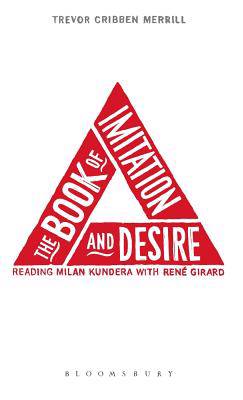
- Afhalen na 1 uur in een winkel met voorraad
- Gratis thuislevering in België vanaf € 30
- Ruim aanbod met 7 miljoen producten
- Afhalen na 1 uur in een winkel met voorraad
- Gratis thuislevering in België vanaf € 30
- Ruim aanbod met 7 miljoen producten
Zoeken
The Book of Imitation and Desire: Reading Milan Kundera with Rene Girard
Trevor Cribben Merrill
Hardcover | Engels
€ 322,45
+ 644 punten
Uitvoering
Omschrijving
Trevor Cribben Merrill offers a bold reassessment of Milan Kundera's place in the contemporary canon. Harold Bloom and others have dismissed the Franco-Czech author as a maker of "period pieces" that lost currency once the Berlin Wall fell. Merrill refutes this view, revealing a previously unexplored dimension of Kundera's fiction. Building on theorist René Girard's notion of "triangular desire," he shows that modern classics such as The Unbearable Lightness of Being and The Book of Laughter and Forgetting display a counterintuitive--and bitterly funny--understanding of human attraction.
Most works of fiction (and most movies, too) depict passionate feelings as deeply authentic and spontaneous. Kundera's novels and short stories overturn this romantic dogma. A pounding heart and sweaty palms could mean that we have found "the One" at last--or they could attest to the influence of a model whose desires we are unconsciously borrowing: our amorous predilections may owe less to personal taste or physical chemistry than they do to imitative desire. At once a comprehensive survey of Kundera's novels and a witty introduction to Girard's mimetic theory, The Book of Imitation and Desire challenges our assumptions about human motive and renews our understanding of a major contemporary author.Specificaties
Betrokkenen
- Auteur(s):
- Uitgeverij:
Inhoud
- Aantal bladzijden:
- 208
- Taal:
- Engels
Eigenschappen
- Productcode (EAN):
- 9781441118653
- Verschijningsdatum:
- 14/03/2013
- Uitvoering:
- Hardcover
- Formaat:
- Genaaid
- Afmetingen:
- 147 mm x 218 mm
- Gewicht:
- 430 g

Alleen bij Standaard Boekhandel
+ 644 punten op je klantenkaart van Standaard Boekhandel
Beoordelingen
We publiceren alleen reviews die voldoen aan de voorwaarden voor reviews. Bekijk onze voorwaarden voor reviews.







